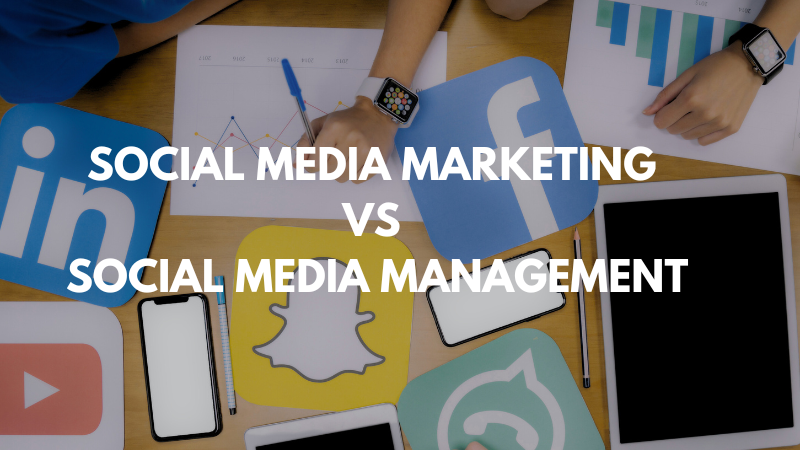
Social Media Marketing vs. Social Media Management: Understanding the Differences
In today's digital age, social media has become an integral part of any business's marketing strategy. However, the terms social media marketing and social media management are often used interchangeably, even though they have different meanings and purposes. In this article, we will define both terms and highlight the main differences between them. We will also provide recommendations on which one to choose based on your business goals.
Defining the Two Terms
Social media marketing is the process of creating and publishing content on social media platforms to promote a product, service, or brand. Its main objective is to drive traffic, increase engagement, and generate leads or sales. On the other hand, social media management involves the daily operations of managing a social media account, including scheduling posts, responding to comments, and monitoring metrics.
Social Media Marketing:
Social media marketing is an essential component of any digital marketing strategy. Its primary objective is to build brand awareness, increase engagement, and drive traffic to a website or landing page. Social media marketing involves creating and publishing content that resonates with your target audience, such as blog posts, videos, info graphics, and images. It also involves running paid ads, such as Facebook ads or Instagram ads, to reach a wider audience.
Social Media Management:
Social media management involves the daily tasks of running a social media account, such as creating and scheduling posts, responding to comments and messages, and monitoring metrics. Social media management ensures that your social media presence is consistent, engaging, and aligned with your brand's voice and values. It involves analyzing social media data to track the success of your campaigns and making adjustments based on the results.
Key Differences between Social Media Marketing and Management
The main differences between social media marketing and social media management are:
1. Objective: Social media marketing is focused on achieving business objectives, such as generating leads or sales, while social media management is focused on maintaining a consistent social media presence.
2. Strategy: Social media marketing involves developing a strategy to promote a product or service, while social media management involves implementing that strategy through daily tasks.
3. Time frame: Social media marketing campaigns are often short-term and tied to specific objectives, while social media management is an ongoing process.
4. Metrics: Social media marketing metrics are focused on measuring the success of a campaign, such as reach, engagement, and conversions. Social media management metrics are focused on measuring the growth and engagement of your social media accounts, such as followers and likes.
Which One to Choose?
Choosing between social media marketing and social media management depends on your business goals. If you're looking to achieve short-term objectives, such as generating leads or sales, social media marketing may be the better option. If you're looking to build long-term relationships with your audience and maintain a consistent social media presence, social media management may be the better option.
FAQs:
What is social media marketing?
Social media marketing is
the process of creating and publishing content on social media platforms
to promote a product, service, or brand. Its main objective is to drive
traffic, increase engagement, and generate leads or sales.
What is social media management?
Social
media management involves the daily operations of managing a social
media account, including scheduling posts, responding to comments, and
monitoring metrics.
How do I use social media marketing and social media management?
To
use social media marketing and social media management effectively, you
need to first define your business goals and develop a strategy that
aligns with those goals. Then, you need to create and publish content
that resonates with your target audience, engage with your followers,
and monitor your metrics to track your success.
What are the different types of social media platforms and how do they work?
There are many different types of social media platforms, including Facebook, Instagram, Twitter, LinkedIn, and YouTube. Each platform has its own unique features and audience. Understanding how each platform works and which one is best for your business can help you create a successful social media strategy.
How do you create and manage a social media account for your business?
To create and manage a social media account for your business, you need to first choose the platform that best fits your target audience. Then, you need to create a consistent brand voice and messaging, develop a content strategy, and monitor your metrics to track your success.
How do you use social media to promote your business?
You can use social media to promote your business by creating and sharing content that resonates with your target audience. This can include blog posts, videos, info-graphics, and images. You can also run paid ads, such as Facebook ads or Instagram ads, to reach a wider audience. It's important to monitor your metrics to track the success of your campaigns and make adjustments as needed.
Conclusion:
In conclusion, social media marketing and social media management are two distinct but essential components of any successful digital marketing strategy. Social media marketing focuses on achieving short-term objectives, such as generating leads or sales, while social media management focuses on maintaining a consistent social media presence and building long-term relationships with your audience. Choosing between the two depends on your business goals and objectives. By understanding the differences between social media marketing and social media management, you can create a successful social media strategy that helps you achieve your business objectives.